Machine/Human Interface
Alarm over talks to implant UK employees with microchips. Britain’s biggest employer organisation and main trade union body have sounded the alarm over the prospect of British companies implanting staff with microchips to improve security.

UK firm BioTeq, which offers the implants to businesses and individuals, has already fitted 150 implants in the UK.
Study Finds it’s Harder to Turn Off a Robot that’s Begging for its Life. Emotional AI Enables Computers to Read Our Moods. Emotions critically influence all aspects of our lives, from how we live, work, learn and play, to the decisions we make, big and small.
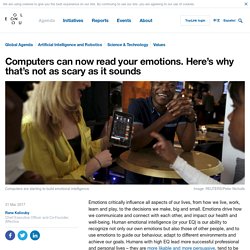
Emotions drive how we communicate and connect with each other, and impact our health and well-being. Human emotional intelligence (or your EQ) is our ability to recognize not only our own emotions but also those of other people, and to use emotions to guide our behaviour, adapt to different environments and achieve our goals. Humans with high EQ lead more successful professional and personal lives – they are more likable and more persuasive, tend to be more effective leaders, and generally lead healthier, happier and even longer lives.
Today, our lives play out in a digital world. We are surrounded by lots of hyper-connected systems, smart devices and advanced AI (artificial intelligence) systems.
The Next Great Computer Interface Is Emerging. Australian-Chinese Research Team Claims World's Thinnest Hologram. A team comprised of researchers from Melbourne's RMIT University and the Beijing Institute of Technology (BIT) has announced the creation of the world's thinnest hologram, touting the invention as paving the way towards the integration of 3D holography into everyday electronics such as smartphones, computers, and televisions.

According to the team led by RMIT distinguished professor Min Gu, the challenge for scientists attempting to turn interactive 3D holograms into reality has been developing holograms that are thin enough to work with modern electronics. "Conventional computer-generated holograms are too big for electronic devices but our ultrathin hologram overcomes those size barriers," Gu said.
Tap Strap Wearable Keyboard uses Gestures to Type on any Surface. You can't accept a new kind of computer into your heart if you don't have a good way to input text.
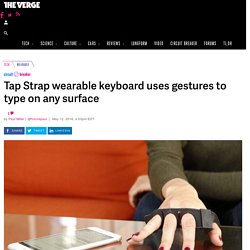
Hardly anyone picked up a smartphone until BlackBerry solved the thumb keyboard, and still most people didn't pick up smartphones until Apple solved the touchscreen keyboard. Some devices, like Google Glass and Apple Watch, have an opportunity to be a new kind of computer, but without an obvious way to type on them, they seem awkward and unnecessary.
Could Brain-to-Brain Communication Make Speech Obsolete?
Unlocking Computers With Brain Signals Instead of Passwords. System authentication could one day be widely achieved through brainwaves, scientists say.
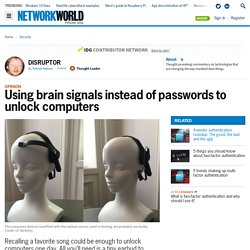
Simply thinking of certain things, such as a person's face, or a rotating displayed cube would be enough to unlock a device. Electro-encephalography (EEC) sensors are behind the technique. That’s where electrical activity in certain parts of the brain is recorded.
Computer System Transcribes Words Users “Speak Silently”
MIT researchers have developed a computer interface that can transcribe words that the user verbalizes internally but does not actually speak aloud.
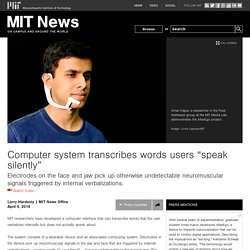
The system consists of a wearable device and an associated computing system.
Thought Experiments. Tangible Media Group. Shape changing interfaces give physical shapes to digital data so that users can feel and manipulate data with their hands and bodies.
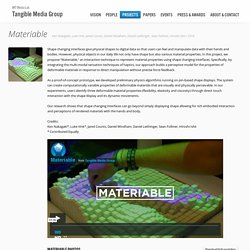
However, physical objects in our daily life not only have shape but also various material properties. In this project, we propose “Materiable,” an interaction technique to represent material properties using shape changing interfaces. Specifically, by integrating the multi-modal sensation techniques of haptics, our approach builds a perceptive model for the properties of deformable materials in response to direct manipulation without precise force feedback.
Social Network Access Unlocked Through Clothes?
New York based Rochambeau (French for the popular game rock-paper-scissors) has effortlessly given birth to a handsome jacket.
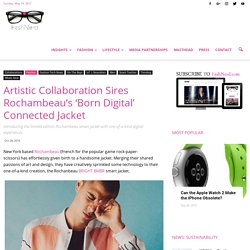
Merging their shared passions of art and design, they have creatively sprinkled some technology to their one-of-a-kind creation, the Rochanbeau BRIGHT BMBR smart jacket. #BornDigital, Rochanbeau’s smart jacket was manufactured with serialized smart labels, tags and added software capabilities which makes the jacket more intelligent and more interactive.
Stitched into the fabric of the physical product, the born digital perks ensure that each limited edition Rochambeau BRIGHT BMBR jacket offers the wearer unique digital content and cultural experiences of the VIP variety. Connecting to an intelligent, software brain in the cloud, the smart jacket works with your smartphone via the smart NFC and the individually numbered QR code/tags hidden in the left sleeve. Share Your Tips & Corrections. Apple Discussing Support of AR Contact Lens With iOS. Apple's iOS might be first to support an augmented reality contact lens system currently in development at EP Global Communications, as the two companies are scheduled to meet next week to discuss potential platform integrations.
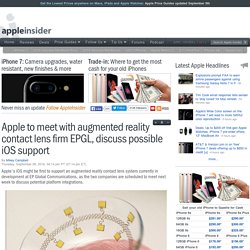
EPGL's smart contact lens proof of concept. According to a tweet posted to EPGL's official Twitter account late last month, the firm is slated to meet with Apple on Sept. 13 "to explore use of iOS for mobile in future augmented reality lenses.
" EPGL has not yet settled on a single mobile operating system to pair with its AR contact lens project, the company clarified in a statement to AppleInsider . "We are having an introductory conversation with Apple about the iOS platform, being the chosen platform for our augmented lens development program," said Michael Hayes, President, EP Global Communications.
Contact Lenses that Recording & Storing What You See.
Elon Musk Advocates ‘Neural Lace’ So We Can Become Cyborgs. Elon Musk is never shy to share his concerns about artificial intelligence.

The Untold Story of Magic Leap, the World’s Most Secretive Startup. Worry about tripping over a tethering cable can seed our unconsciousness with doubt. It might look like it’s there, but it won’t feel there. Following his hunch to exploit human biology, Abovitz set off to make an artificial-reality display in a more symbiont way. The phonelike screens used in the majority of head-mounted displays created a nagging problem: They were placed right next to your eyeballs. If the device is generating the illusion of a blue whale 100 feet away, your eyes should be focused 100 feet away.
With AR, You Can Use Your Arm As A Keypad. Say hi to ARmKeypad Air, which uses ‘smart’ glasses to turn the arm of a wearer into a virtual keyboard, allowing for contact-free use.
Asian Scientist Newsroom | July 13, 2016 | Technology. Profusa Awarded $7.5M To Develop Implantable Biosensors. Profusa has been awarded a $7.5 million grant from the Defense Advanced Research Projects Agency (DARPA) and Army Research Office. The grant will be used toward efforts to develop implantable biosensors that can continuously monitor multiple body chemistries. The initial aim of the tech is to have continuous monitoring capabilities for combat soldiers’ health status with the end goal of improving mission efficiency.
"Your Voice Is Your Stamp”—USPS. Alexa's Journey to Fundamentally Change Human-Computer Interaction. Disney's Haptic VR Jacket Goes Beyond Sight & Sound.
Virtual reality is a gateway to powerful experiences.
How Apple Will Use AR To Reinvent The Human-Computer Interface. Where Is Tech Taking Us? A Complete Merger of Our Digital, Physical Worlds.










